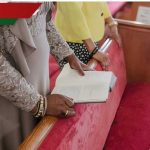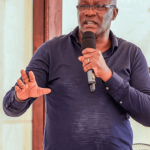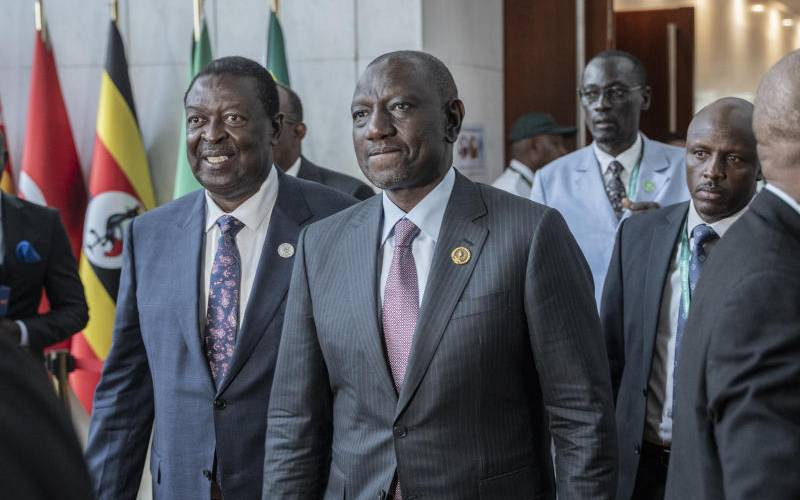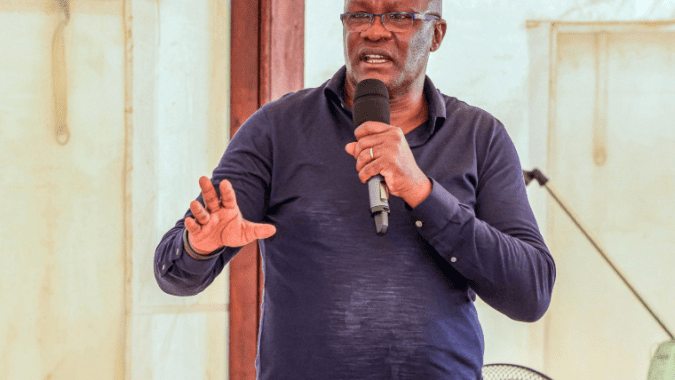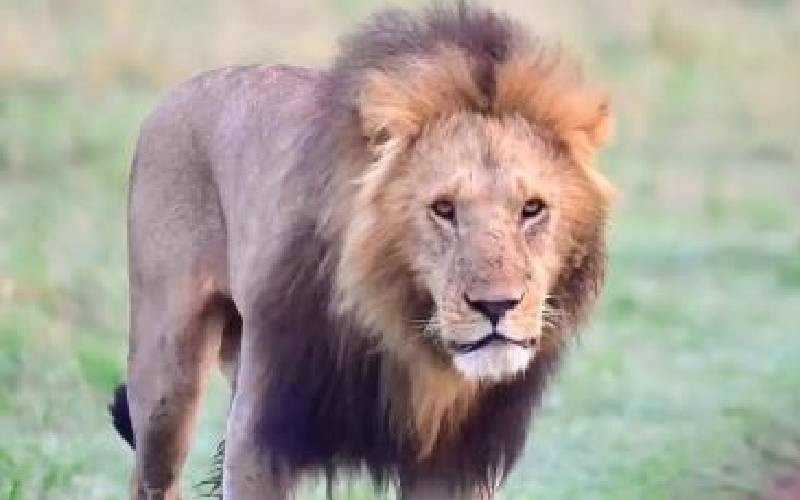President of Kenya William Ruto (C) exits a closed session meeting ahead of the 38th African Union (AU) Summit, where leaders will elect a new head of the AU Commission, at the AU Headquarters in Addis Ababa on February 14, 2025. [AFP]
President William Ruto’s diplomatic missteps have left Kenya bruised and isolated on the continental stage, culminating in what many see as Raila Odinga’s failed bid for the African Union Commission (AUC) chairmanship.
From alienating regional allies over the Democratic Republic of Congo (DRC) crisis to his controversial stance on the Israel-Gaza conflict, pundits believe Ruto’s foreign policy has been a masterclass in blundered statecraft.
“This election was not about individuals or nations; it was about Africa’s future. That future remains bright, and together, we will continue working for a united, prosperous, and influential Africa on the global stage,” Ruto said after the AU polls.
Despite an oiled campaign to support Azimio leader Raila Odinga for the AU Commission Chairperson post — which saw President Ruto, opposition leader Raila Odinga, and Prime Cabinet Secretary Musalia Mudavadi traverse the continent, host dignitaries, and boast of selling Raila’s candidacy — Raila lost the AUC Chairperson race to Djibouti’s Mahamoud Ali Youssouf in elections held in Addis Ababa, Ethiopia, on Saturday afternoon.
“Now you hear some people — I do not know if they are cursed — opposing Raila. You do not want the position, and you did not ask for it, so why are you opposing? Let us pray for some of these people that God helps and forgives them,” Ruto said on January 23 at the Busia airstrip.
Raila led the first two rounds with 20 and 22 votes, but Mahamoud surged ahead in the third round with 23 votes against Raila’s 20, eliminating Madagascar’s Richard Randriamandrato.
“While the outcome of this election did not favour Kenya’s candidate, I wish to convey my deepest gratitude to the entire leadership of our great continent. Thank you for considering the Right Honourable Raila Odinga’s vision and priorities for the African Union and for according him the opportunity to share his passion for the continent’s transformation,” Ruto explained.
Mahamoud extended his lead with 25 votes in the fourth round and 26 votes in the fifth and sixth, while Raila garnered 21 and 22 votes. After Raila was eliminated in the seventh round, Mahamoud secured 33 votes, clinching the two-thirds majority needed to succeed Moussa Faki of Chad. To make matters worse, Kenya lost the chairmanship and failed to bid for and win other positions in the committees.
“On behalf of the Government and the people of the United Republic of Tanzania, I extend my heartfelt congratulations to His Excellency Mahmoud Ali Youssouf on being elected as the Chairperson of the African Union Commission,” read the statement from Tanzania, which is a member of both the EAC and SADC, as well as a neighbor to Kenya. Tanzania was the first to congratulate him but failed to mention Raila, who lost. The statement added, “I look forward to working with you in our collective pursuit of a more prosperous, united, and peaceful Africa.”
Some political observers like Arnold Maliba see Ruto as Africa’s blue-eyed boy who shone in in his first year but failed to maintain that status.
“Countries don’t vote on sentiments. Nairobi campaigned well, and if campaigns won votes, this would have been a landslide, but many factors affect these elections,” Maliba said. “Voting patterns are historical. Nairobi must sharpen its diplomacy. We run our foreign policy the way we run our politics — very experimental.”
Former Nyeri Town MP Ngunjiri Wambugu dismissed Kenya Kwanza operatives and Members of Parliament who claimed that former President Uhuru Kenyatta decampaigned Raila, explaining, “Uhuru has a big name, and he deserves respect.”
He added that many African nations feared that if Kenya gained a powerful position to influence the AU, it might dictate terms to weaker nations.
Stay informed. Subscribe to our newsletter
“We were there eight years ago campaigning for Amina Mohamed, and I can say there is fear of having Kenya in a powerful position because it might dictate weaker nations,” he said.
The president’s blunders started at his swearing-in when he recognized Sahrawi. President Brahim Ghali of the Sahrawi, which seeks recognition as an independent nation despite Morocco’s claims that it is an integral part of its kingdom, attended Ruto’s inauguration.
“Kenya rescinds its recognition of the SADR and initiates steps to wind down the entity’s presence in the country,” Ruto said in a tweet. However, the president deleted the tweet, leaving one that read: “Kenya supports the United Nations framework as the exclusive mechanism to find a lasting solution to the dispute over Western Sahara.”
As drama unfolded, sources within the Ministry of Foreign Affairs told The Standard off the cuff that politicians have taken over diplomatic pronouncements, sidelining seasoned diplomats. The president, who often comments on international matters — sometimes correctly, sometimes causing deep diplomatic wounds — drew sharp criticism when he bypassed regional mechanisms by inviting French President Emmanuel Macron to mediate the DRC conflict.
“It felt like an unnecessary intrusion,” said a senior diplomat at the Ministry of Foreign Affairs, adding, “Our biggest challenge has been political statements made without consulting the right people at the ministry.”
A top official at the Ministry explained that Kenya’s support for Israel against Gaza did not sit well with the Muslim community on the continent.
“In diplomacy, you respond when it is necessary. The support for Israel did not go well with the Muslim community and the fight against the dollar didn’t go well with the United States,” he said, adding, “We are waiting for the final votes so that we can analyse.”
President Felix Tshisekedi of the DRC, a member of both the East African Community (EAC) and the Southern African Development Community (SADC), retaliated by refusing to grant credentials to Kenya’s ambassador, further straining relations. An emergency EAC summit convened by President Ruto on Wednesday night, called on the DRC government to engage directly with all stakeholders in the conflict, including M23 and other armed groups. Notably absent from the virtual summit was Tshisekedi.
“The President of the Democratic Republic of Congo, Félix Tshisekedi, will not participate in the virtual summit of heads of state of the East African Community,” the Congolese Press Agency announced on January 29.
The summit, attended by Rwanda’s Paul Kagame, Uganda’s Yoweri Museveni, Tanzania’s Samia Suluhu, Somalia’s Hassan Sheikh Mohamud, Burundi’s Evariste Ndayishimiye, and South Sudan’s Salva Kiir, called for an “immediate, unconditional ceasefire and humanitarian access” in Goma.
It condemned attacks on foreign embassies in Kinshasa and urged the DRC to protect diplomatic missions after several were looted. This meeting occurred as bodies lay in Goma’s streets, with over a million displaced amid accusations that Rwanda backs the M23 rebels, who have seized much of the city, including its airport.
The meeting came as rebels killed South African soldiers, escalating a diplomatic tiff between Rwanda and South Africa.
“President Ruto has had discussions with French President Emmanuel Macron and United States Secretary of State Marco Rubio on the situation in the Eastern Democratic Republic of Congo,” Ruto said.
Pundits and foreign affairs officials explained that Kenya’s siding with the EAC forced South Africa to mobilize SADC and ECOWAS countries, including Angola, Botswana, Comoros, Eswatini, Lesotho, Madagascar, Malawi, Mauritius, Mozambique, Namibia, Seychelles, Tanzania, Zambia, Zimbabwe, Benin, Burkina Faso, Cabo Verde, Côte d’Ivoire, Ghana, Guinea, Liberia, Mali, Niger, Nigeria, Senegal, Sierra Leone, and Togo, to support Djibouti’s candidate.
“This letter, therefore, serves to encourage SADC member states to support Mr Richard J. Randriamandrato, a candidate from our region, for the position of the AUC chairperson during the upcoming elections of Senior Leadership of the African Union Commission, in line with the August 2024 council decision stated above,” SADC Executive Secretary Elias Magosi last Wednesday wrote to members urging them to vote for former Madagascar Foreign minister Richard Randriamandrato.
This diplomatic snub highlighted Kenya’s dwindling influence under Ruto’s leadership. SADC, backed by ECOWAS, rallied behind Djibouti’s Mahamoud Ali Youssouf for the AUC chairmanship, leaving Raila politically marooned. Tanzania’s President Suluhu swiftly congratulated Youssouf, emphasizing regional solidarity while excluding any mention of Raila.
Ruto’s foreign policy blunders extend beyond the DRC crisis. His reversal of support for a SADC candidate during the COMESA elections fostered distrust among southern African nations. Last year, the European Union and the United States took on President Ruto over human rights abuses and enforced disappearances, with the Kenya Human Rights Commission announcing that at least 82 Kenyans have disappeared since protests began in June last year when Kenyans staged nationwide protests against Ruto’s leadership.
“We express concern over ongoing reports of arbitrary arrests and enforced disappearances despite High Court rulings. It is crucial to ensure the rule of law prevails and that judicial rulings are respected,” said a statement signed by the German, Swedish, Dutch, Finnish, Irish, Danish, Norwegian, Swiss, and UK embassies in Kenya.
Within Kenya, hundreds have protested on social media against Raila, whom they believe betrayed them by joining Ruto’s government despite its human rights violations.
Ann Kamau, a youth hawking on the streets, explained that it was wrong for Raila to gain from their blood.
“Kenyans died for him to join the government, and Raila expected us to support him. Raila has failed to stand with us. How will he protect Africa when he ignores us as youths are being kidnapped and killed?” she said, adding, “That’s why we have been on social media, on every page, including Ruto’s and AU’s, to say that our candidate remains the Djibouti candidate.”
A viral Gen Z campaign mocked Raila’s age, portraying him as outdated through online caricatures, songs against Ruto, and printed T-shirts.
Maliba explained that Raila’s loss is complex. “Our colonial masters and the region are the main influence. Kenya lost diplomatic shine, edge, and pace. Diplomats being appointed are incompetent and have no influence,” Maliba said. He added that Kenya’s reliance on the U.S. to run its financial systems has caused significant problems.
“We might see it lightly, but no influential investors want to bring their funds here,” Maliba said, adding that this benefits South Africa and other countries. He noted that Kenya’s failure to leverage trade influence negatively impacts its diplomacy. “Diplomatically, we no longer manufacture influence the way we used to. Trade has failed. We are consumers and can’t dictate. Lose on trade, lose on diplomacy,” he said.
Maliba also cited regional rivalries within the EAC. “We are still fighting over basic issues like boundaries and passports. The EAC is still a mess,” he said, adding that Kenya must address EAC challenges to restore its diplomatic influence.
Wambugu, a Gachagua and Uhuru ally, said that their team wanted Raila to serve the world.
“Every candidate campaigned well. Every country uses what is in their interest to win these elections…” Wambugu said.

